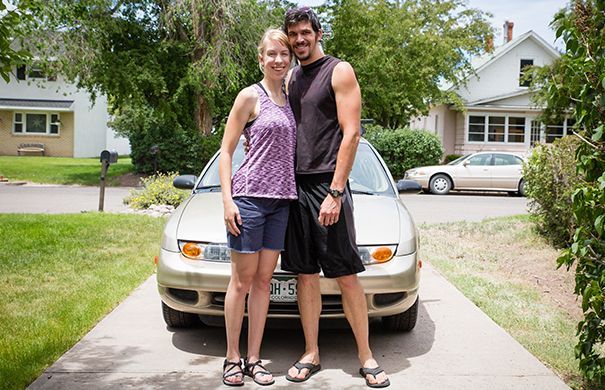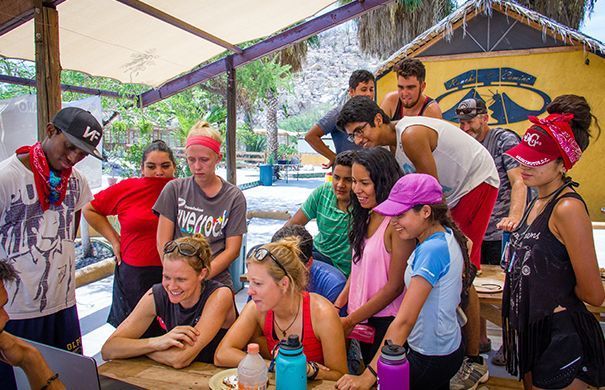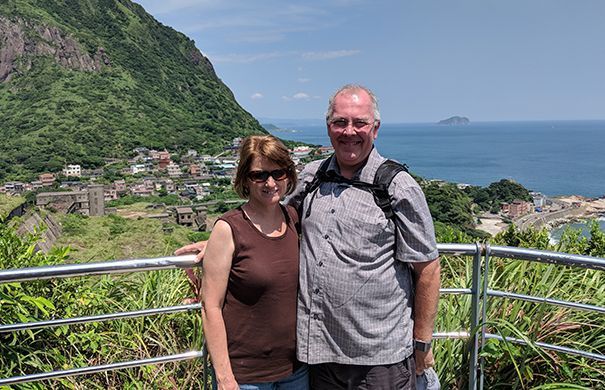A recent college graduate, a young married couple and a nearly retired couple wouldn’t typically have a lot in common.
Gen Z-ers are just starting their careers and learning how to live as independent adults. Millennials are navigating buying houses, settling down and maybe even starting a new family. Baby Boomers are considering what life looks like after retirement and trying to decide how they will spend their post-career years.
And yet, they do share one big thing: God is using them in short-term missions.
A Couple with a House, Careers — and a Calling
Going on a short-term mission trip after you’ve settled down with a spouse, a house and a career would just be impractical, right?
Rachel and Brandon Maston would beg to differ.

Rachel and Brandon Maston were newly married and looking forward to starting their life together when God began to open their hearts to missions work. Photo courtesy of the Mastons.
The Mastons weren’t planning on being missionaries . Rachel is a graphic designer by trade. Brandon is a photographer and video producer. But a year after they got married, Brandon read David Platt’s book, Radical .
“There were a lot of thoughts that just kind of lit up in my mind that, you know, that this is possible,” Brandon says, “and this is what God calls us to do, is to actually have a ministry and go out and be part of something.”
So, Brandon began researching mission agencies. When he found TEAM , he and Rachel were struck by how eager everyone was to help them find a way to use their talents.
Brandon’s company was supportive of their decision to serve abroad for some time. And Rachel was thankful for the chance at a fresh start in her career. But they had no idea what they’d do with their house for the eight months they’d be gone.
Eventually, they decided that no matter what happened, they were definitely going to go. And that’s when God provided.
One of their pastors had a relative who needed somewhere to stay but only for a short amount of time.
“So, we met up with her and talked through it,” Rachel said. “And it worked out perfectly that she needed a place to stay, and nine months or so to stay there, and we had a place for her to stay.”
Six months later, Brandon and Rachel were living and serving in La Paz, Mexico.
Their primary ministry was to support long-term ministries through video production and graphic design. They created materials to help with fundraising and awareness campaigns.

In Mexico, Rachel and Brandon used their videography and graphic design skills to make resources for long-term missionaries. Photo courtesy of the Mastons.
But they also joined a Monday night Bible study and integrated themselves in the Mexican community through biking and other activities. By participating in these things, they not only used their skills but also got to share Jesus with the people around them.
“The Mastons left behind videos and brochures that we will be using far into the future. The professionalism in their work was exceptional,” says long-term TEAM missionary Steve Dresselhaus. “The eternal value of their work will be seen in the quick and easy way they made friends. They immediately became part of our Monday night group.”
Both Brandon and Rachel are grateful for the chance to make a long-term difference for the Lord’s global ministry in just eight months.
“God doesn’t call people who have their lives all put together. But by making you go, He puts your life together in a way that’s going to be glorifying to Him, if you’re just available and willing, ” Rachel says.
College Grad Finds Unexpected Future
Stacey* was just a college student, but she thought she did have her life figured out. She was getting her degree in political science, and she was going into the foreign service.
But when she attended an extra credit lecture led by a TEAM missionary, she was intrigued. How did this guy know so much about Islam and Muslim culture ?
Later, she got a call from TEAM missions coach Tasha Eckenhoff. Tasha had seen Stacey’s name on the sign-in list at the lecture and wanted to get together.
Okay, that’s fine, Stacey thought. I’m not going to do missions, but we can get coffee.
A year and a half of friendship later, Tasha told Stacey about a short-term missions opportunity in North Africa through a program is called LAUNCH Intensive.
LAUNCH is designed for short-termers to see if they would be able to thrive on the mission field long-term. The idea excited Stacey — but she soon found out the program is very competitive.
Well, I’ll apply, Stacey thought. But nothing is ever going to come of it.
“And then, it happened,” she says later. “And I think it was probably one of the most influential … experiences I’ve had.”

For recent college graduate Stacey, a short-term missions trip to North Africa changed her worldview – and future plans. Photo courtesy of Stacey.
Stacey thought she knew what she wanted to do with her life. But on that trip to North Africa, God opened her eyes to a people group and culture that she fell in love with.
“We’ve gone to every other part of the world expecting to live out our days there, in order to share the Gospel with those people. And for whatever reason, we haven’t done that with Muslims the way I think they deserve,” Stacey says. “And that just breaks my heart because they’re incredible people. And they have huge hearts. And they want to love you, and they want to care for their families just like the rest of us. And for some reason, we’ve kind of determined that they don’t deserve that.”
Stacey’s post-graduation plan now is to serve the Muslim diaspora in Europe mid-term. Then maybe even long-term.
All because of one college lecture — and one short-term experience.
Going Short-Term in Their Golden Years
It’s one thing to serve overseas as a college grad. But with grandchildren to spoil and finances to consider, serving overseas after retirement seems like a whole other thing.
But it’s more than possible.
David and Jan Fitzgerald are soon-to-be retirees who pastor a multicultural church in Colorado Springs.
It started with a group of Vietnamese refugees in the 90s. Then came Latin Americans. Then Chinese immigrants. And now, 34 years after they first planted the church, the Fitzgeralds find themselves surrounded by internationals.
So they decided to put their intercultural skills to use by serving God overseas on a short-term trip.

Jan and David Fitzgerald didn’t let their life stage stop them from seeing what the Lord might have in store for them in Taiwan — possibly for years to come. Photo courtesy of the Fitzgeralds.
“We’re constantly thinking about people that come here from other countries, what they’re going through, their experience of life here, and the challenges of it,” says David. “And that, actually, probably helps us a little bit when we go overseas to realize a little bit of what they’re facing when they come to live here.”
They set their sights on Asia, and David learned to speak Mandarin. When they heard about TEAM’s short-term opportunity in Taiwan , they jumped at the chance.
“We got an opportunity both to experience Taipei as well as other scenery,” David said. “But we also got an opportunity to see what TEAM is doing in Taiwan, in terms of church planting and ministry , both in Taipei and other places as well on the island.”
They also visited Trailblazer Camp — a ministry that the long-term team in Taiwan uses to reach local children.
“Sometimes, we tend to mix up our culture with Christianity. And [short-term trips] give us a bigger view of the world and of what God is doing,” David said. “There are Christians on the other side of the world that serve the Lord. And they don’t look like I look. And they don’t eat what I eat. And they don’t always behave the same way that I behave. And that’s okay.”
Now, the Fitzgeralds are considering moving to Asia long-term to pursue ministry.
The One Commonality
Being a long-term missionary isn’t for everyone, even if you have a passion for global missions. But with short-term missions, people of all life stages can make an impact for long-term work.
And even though the Mastons, Stacey and the Fitzgeralds have a lot of differences, they do have one important commonality: God can use them in short-term missions.
And He can use you.
*Name changed.




















